In a world where algorithms predict the next touchdown before the quarterback takes the snap, artificial intelligence isn't just changing sports betting — it's revolutionizing how we understand the game itself. With the industry projected to reach $153.57 billion by 2030, AI and data analytics are transforming every aspect of sports wagering, from odds calculation to fraud detection.
The digital revolution in sports betting
While the sports betting industry has traditionally been viewed as transactional—users place their bets, hope for the best, and move on — AI is allowing operators to build a far more engaging, user-centric experience. This article will delve into the various ways AI is revolutionizing sports betting, from personalized recommendations and real-time in-play betting to the broader implications of this technological shift for both bettors and sportsbooks.
Modern platforms now process over one terabyte of data daily, analyzing everything from player performance metrics to weather conditions, creating a more sophisticated and accurate betting environment.
The power of prediction
Today's AI systems demonstrate remarkable capabilities:
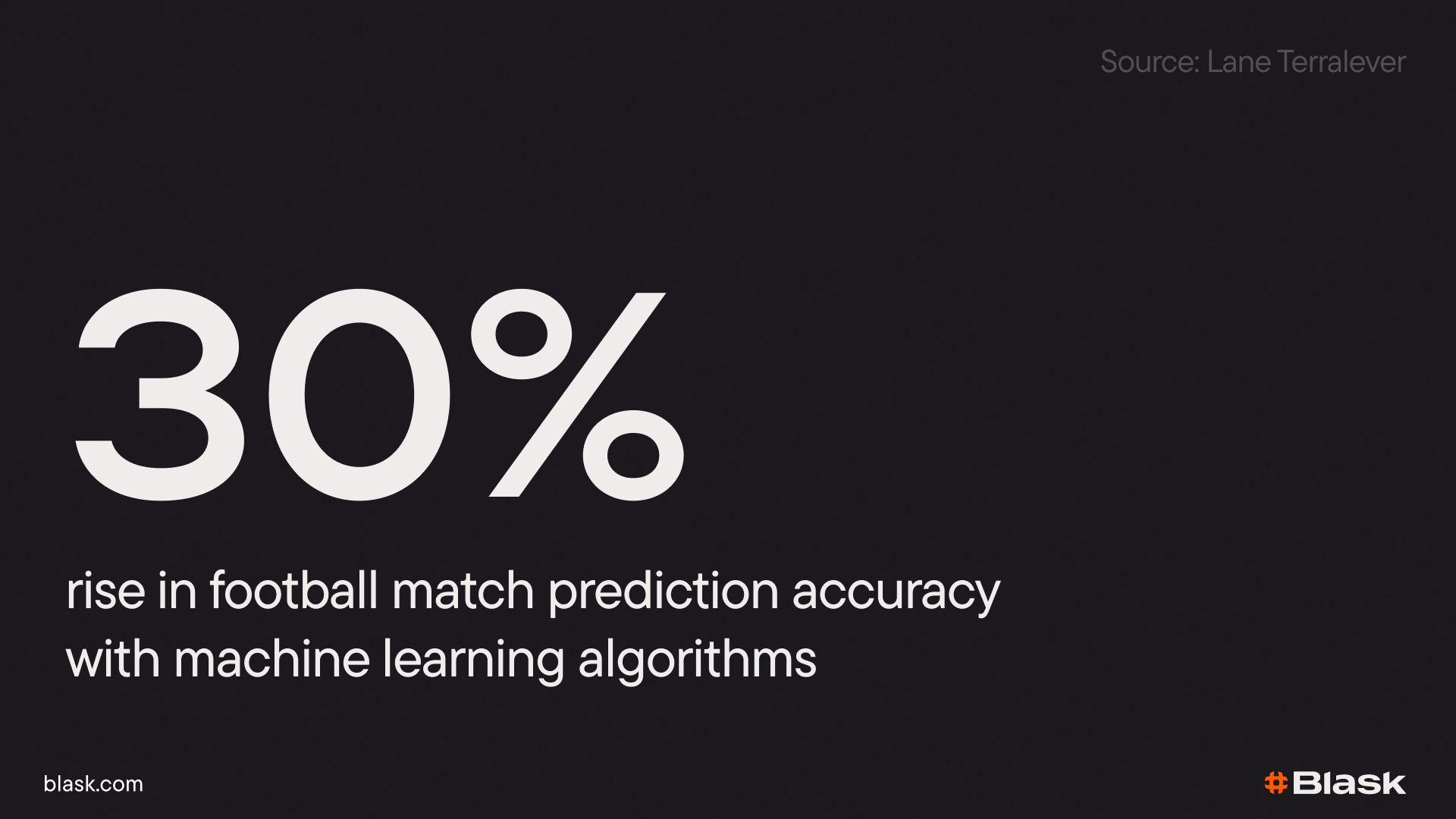
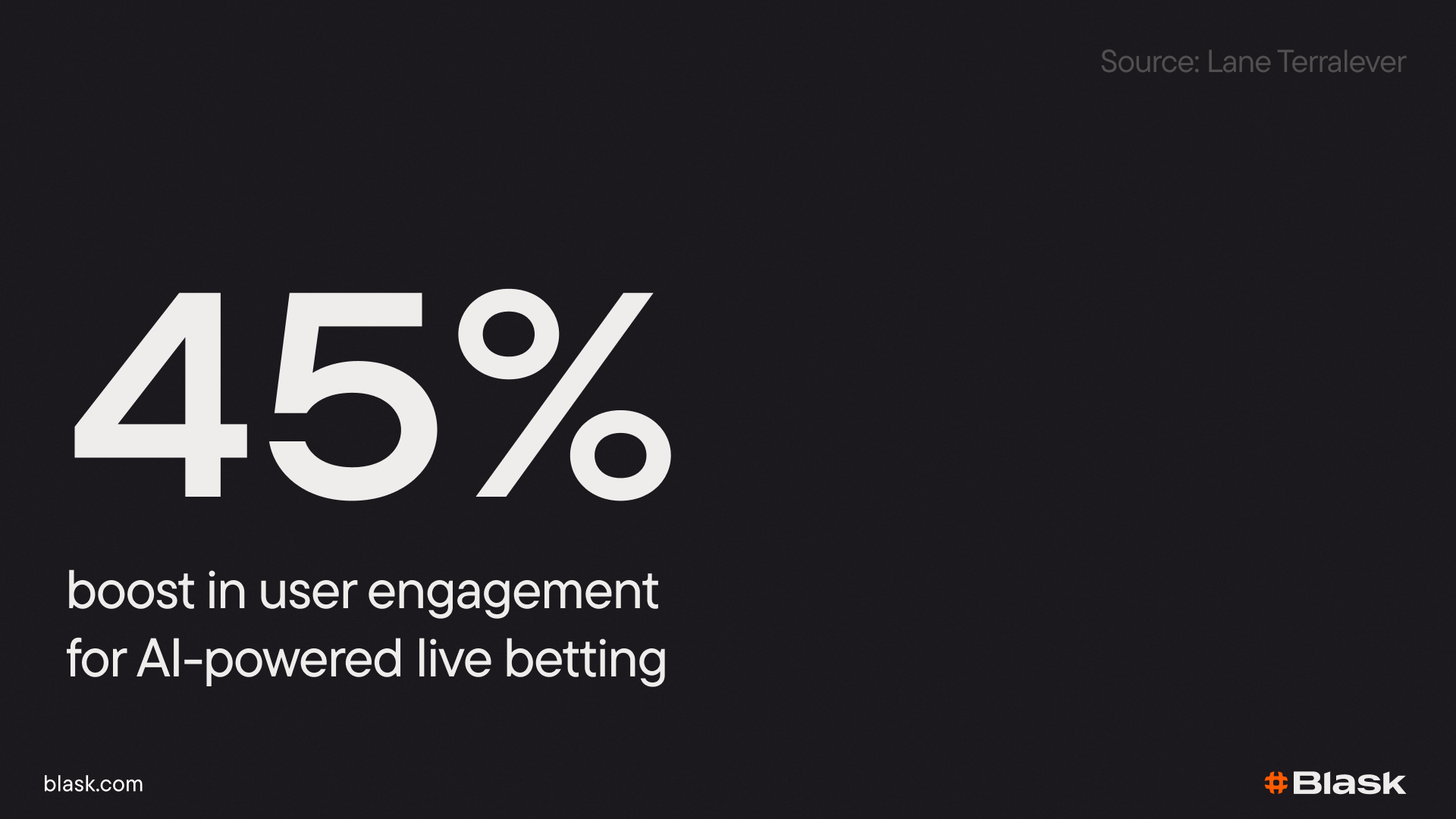
- Predict outcomes with 85% accuracy
- Reduce operational downtimes by 20%
- Improve fraud detection by 50%
- Increase player engagement by 30%
AI personalization: the future of betting
A model for sports betting
If you’ve ever logged into Netflix and found a curated list of shows based on your viewing history or shopped on Amazon and received tailored product recommendations, you’ve experienced the power of AI-driven personalization. These platforms have become experts in predicting user preferences and delivering customized experiences. Sports betting, traditionally seen as more transactional and less personalized, is now following suit.
AI is poised to elevate the user experience in sports betting by offering more tailored options based on individual behaviors, preferences, and historical data. In fact, many sportsbooks are already testing and rolling out AI-driven recommendation engines that can provide bettors with custom-tailored betting opportunities—both before and during events.
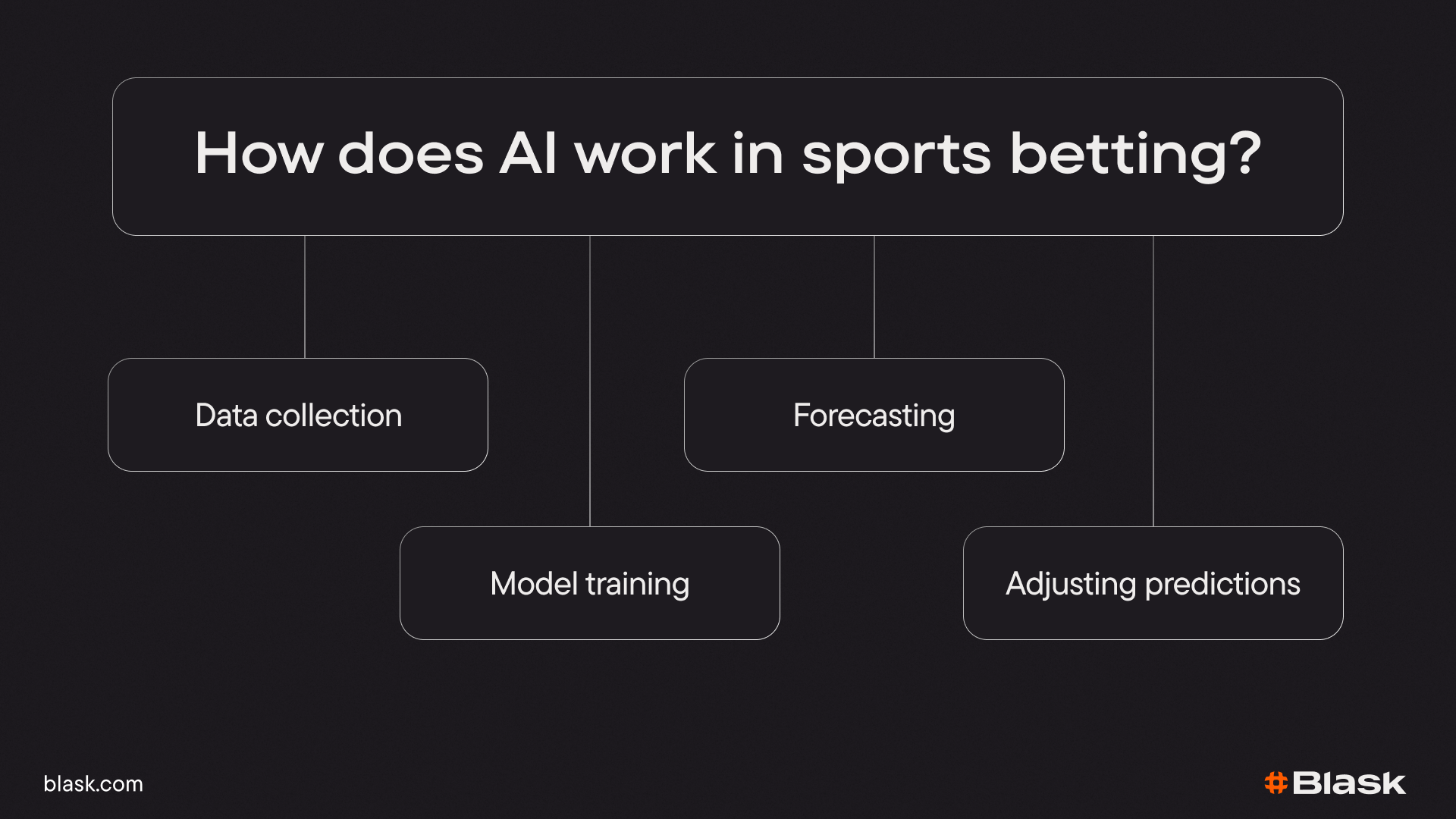
"AI will allow sportsbooks to build personalized experiences for users in ways that were unimaginable a few years ago. By analyzing everything from a user’s betting history to their preferences and even the way they interact with content, we can create a betting experience that feels intuitive and personal."
Rob Phythian, CEO of SharpLink Gaming
The numbers behind personalization
In industries like retail and entertainment, research has shown that personalized experiences can drive significant growth. A 2018 report by McKinsey found that personalized experiences in e-commerce could drive a 10 to 30 percent increase in revenue, while 71% of consumers expressed a preference for personalized shopping experiences.
In sports betting, personalization is seen as a key strategy to increase user retention and boost overall engagement. A study conducted by Nielsen found that 72% of online gamblers said they would bet more if betting platforms offered more personalized content and recommendations. Additionally, AI-driven betting personalization could help bettors make smarter, more informed decisions, potentially increasing their satisfaction and retention on the platform.
How AI transforms the sports betting experience
1. AI-Powered betting recommendations
At the heart of AI-driven personalization lies machine learning, which allows sportsbooks to analyze vast amounts of user data and generate recommendations in real time. When a user logs into their sportsbook account, they are greeted with a personalized experience based on their betting habits, sports preferences, and even the types of bets they usually place.
The AI-driven system uses data from a bettor’s personal account management (PAM) system to create a profile that accounts for their favorite teams, betting preferences, and spending habits. This information is then leveraged to offer personalized betting opportunities.
As an example, imagine you’re a bettor who typically wagers $50 and has a keen interest in fantasy player props, particularly for NFL games. When you log into the platform, you won’t just see generic betting options. Instead, the system will provide you with customized suggestions based on your preferences, such as a parlay bet for the upcoming Giants’ game or a fantasy prop bet for a specific NFL player.
2. Real-time in-play betting
One of the most exciting applications of AI in sports betting is in the realm of in-play betting, where bettors place wagers on games as they unfold in real time. Traditionally, in-play betting has been limited in scope, with sportsbooks offering only a few basic betting options once a game begins. However, AI is transforming in-play betting by providing bettors with more relevant and dynamic options as the game progresses.
This type of real-time personalization creates a more engaging experience for bettors, as they are continuously presented with fresh opportunities to place wagers during the course of the game. The immediacy of these betting options, combined with the relevance of the suggestions, can significantly increase the chances of a successful bet, which benefits both the bettor and the sportsbook.
3. AI-powered smart search
Another area where AI is enhancing personalization is in the search functionality on betting platforms. AI-driven smart search allows bettors to find relevant events, teams, or players more easily, even if they make spelling mistakes or use non-standard terms.
This kind of smart search not only improves the overall user experience but also helps bettors find what they are looking for faster, leading to more time spent on the platform and potentially more bets placed.
4. Tailored betting experiences: combining interests, preferences, and context
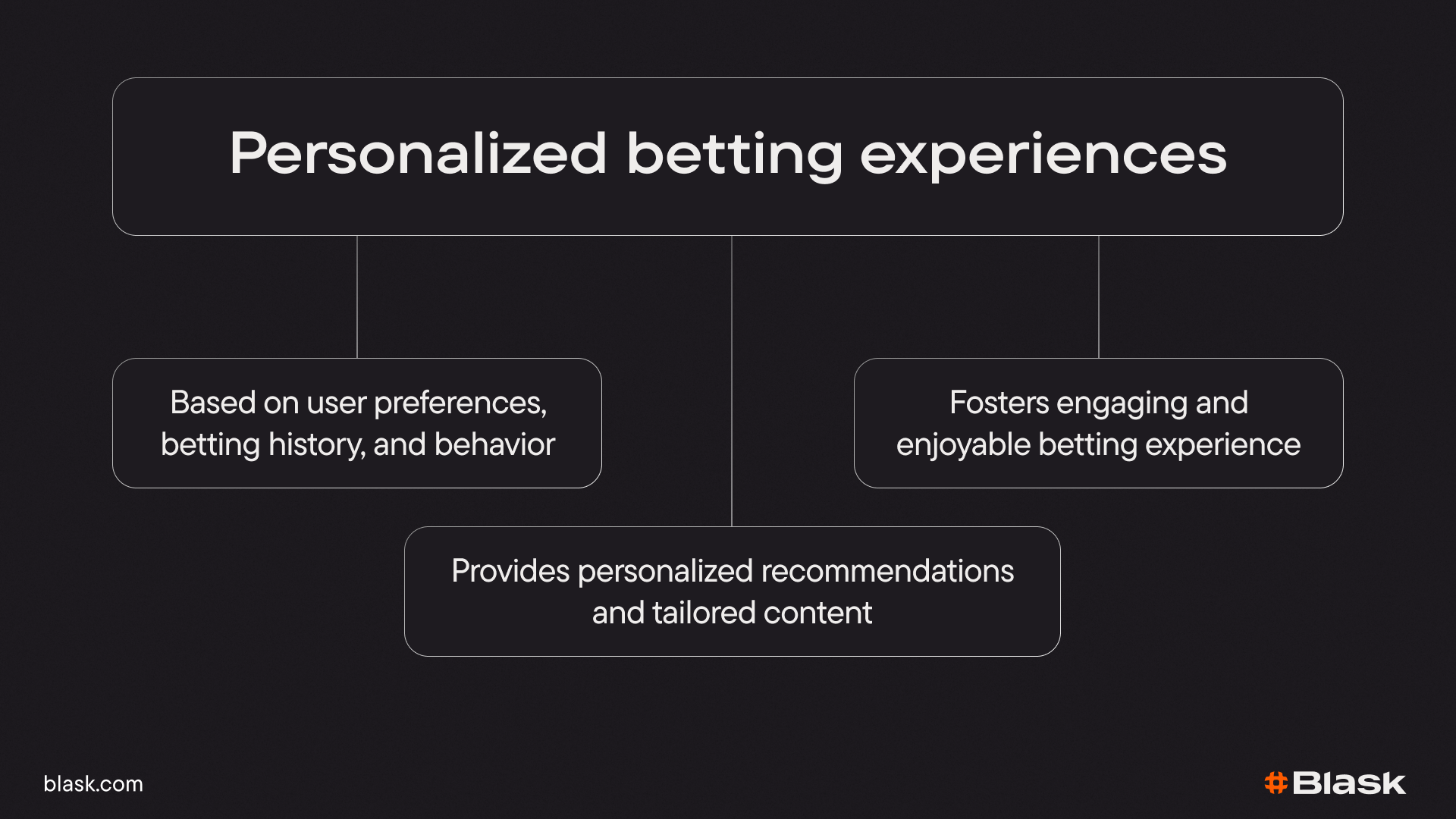
AI is not just about making predictions — it’s about combining a user’s interests with real-time context to create a truly personalized experience. For example, when a user logs into a sportsbook, they may see a curated list of bets not only based on their past behavior but also based on current events in the world of sports.
If there’s a major game coming up that aligns with the user’s interests — say, a championship match involving their favorite team — the AI system will highlight this event and suggest specific bets that are related to it. If the user’s preferred team is playing in an important match, they might be offered special promotions, like free bets or odds boosts, specifically tailored to that event.
This level of personalization doesn’t just make the betting experience more enjoyable; it also helps to increase retention by encouraging users to return to the platform more frequently. The more personalized the experience, the more likely users are to stay engaged over time.
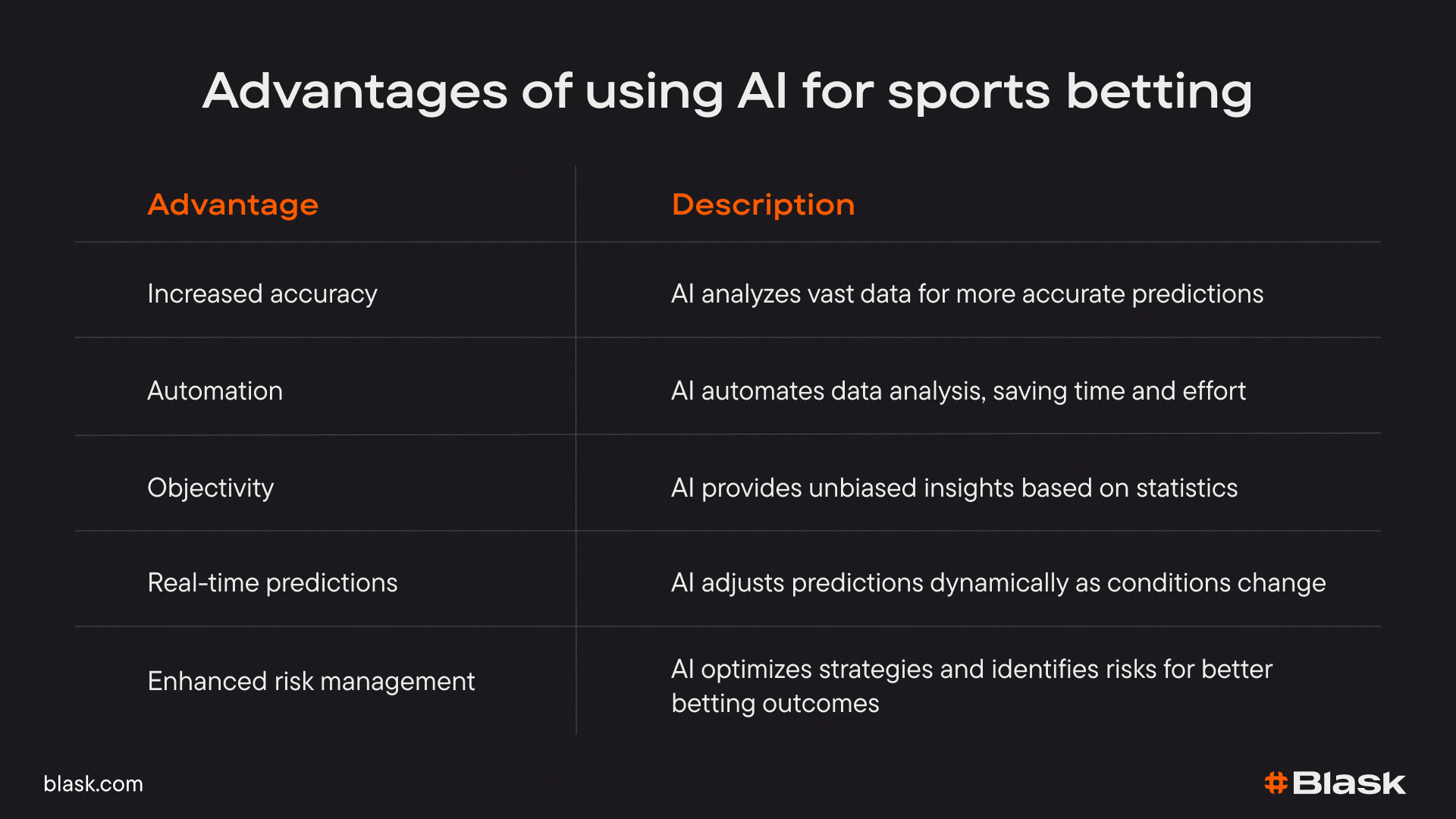
The challenges of implementing AI in sports betting
While the potential of AI in sports betting is immense, there are significant challenges in implementing these technologies on a large scale. One of the primary obstacles is the integration of AI systems with existing sportsbook platforms, many of which are built on legacy European technologies.
Phythian explains,
"A lot of sportsbooks are sitting on older tech that wasn’t designed for AI integration. That’s one of the biggest hurdles we face—getting these platforms to work seamlessly with new AI-driven systems."
Another challenge is the vast amount of data required to train AI models. Sportsbooks must have access to large datasets—ranging from historical betting data to real-time game statistics—to effectively power AI algorithms. As AI models become more sophisticated, they will require even more data to improve their predictions and recommendations.
Despite these challenges, the potential rewards are too great for sportsbooks to ignore. As more companies invest in AI-driven personalization, we can expect to see a rapid evolution in the sports betting experience.
Responsible gambling in the age of personalization
As AI transforms the sports betting industry, it’s crucial that operators remain committed to promoting responsible gambling. While personalized experiences can enhance user engagement, they must not encourage problematic behavior or excessive gambling.
AI systems can be designed to promote responsible gambling by tracking user spending patterns and flagging potentially risky behavior. For example, if a user consistently exceeds their budget or begins placing large bets in a short period of time, AI systems can intervene by offering reminders to take breaks, set limits, or even take a temporary pause from betting.
Conclusion
The rise of AI in sports betting is a game-changer. As sportsbooks integrate more personalized and dynamic betting experiences, bettors will enjoy a far more engaging and tailored experience than ever before. With the potential for real-time recommendations, personalized suggestions, and smarter user interfaces, AI promises to redefine the way people interact with sports betting platforms. However, as the industry moves forward, it will be essential for operators to balance innovation with responsibility, ensuring that AI-driven personalization enhances the user experience without encouraging problematic gambling behavior.
In the coming years, AI could very well become the cornerstone of sports betting, ushering in a new era of highly engaging, user-centric experiences that will reshape the way fans engage with their favorite sports. Whether it's pre-game bets, in-play action, or even future trends, AI is setting the stage for a smarter, more personalized future of sports gambling.
FAQ.
How is artificial intelligence changing the sports betting industry?
Artificial intelligence (AI) is transforming the sports betting industry by improving decision-making processes, automating tasks, and optimizing strategies through real-time data processing and predictive modeling. This leads to more accurate betting odds and enhanced user experiences.
What benefits do data analytics offer in sports betting?
Data analytics in sports betting enables operators to analyze vast amounts of data quickly, optimize betting strategies, and set more precise odds. It ultimately leads to more informed decision-making and potentially higher profits for both operators and bettors.
Are there ethical concerns regarding AI and data analytics in sports betting?
Yes, ethical concerns in using AI and data analytics in sports betting include ensuring fairness, transparency, and impartiality. As these technologies advance, stakeholders must address potential biases and disclose how data is being used to maintain integrity in betting practices.
What legal challenges do sports betting companies face with the adoption of AI and data analytics?
Sports betting companies face various legal challenges such as complying with national and international regulations, ensuring data protection, and adhering to gambling laws. Non-compliance can lead to legal repercussions and damage to the company's credibility.
How can sports betting companies protect themselves from legal issues when using AI and data analytics?
To protect themselves from legal issues, sports betting companies should prioritize adherence to data protection laws, ensure transparent data usage practices, and stay updated with changing regulations. Establishing clear compliance frameworks and conducting regular audits can help mitigate legal and ethical risks.
Unlock your iGaming potential with Blask!
Blask empowers you to make data-driven decisions, optimize marketing strategies, and drive significant GGR increases by providing unparalleled clarity about the iGaming market and your performance.
Curious about our precision? Discover our article "What is Blask?" and how Blask's cutting-edge technology is transforming iGaming analytics.
Ready to experience Blask in action?
- Sign up for free demo access and explore real data on the TOP-5 brands per country: Get a firsthand look at Blask's capabilities.
- Request a personalized demo with full access to data tailored to your niche and objectives. Fill out the form at blask.com to help us prepare use cases specific to your needs.
Need assistance?
Our support team is always here to help. Click the chat icon in the bottom right corner of your screen to connect with us instantly and get the answers you need.
